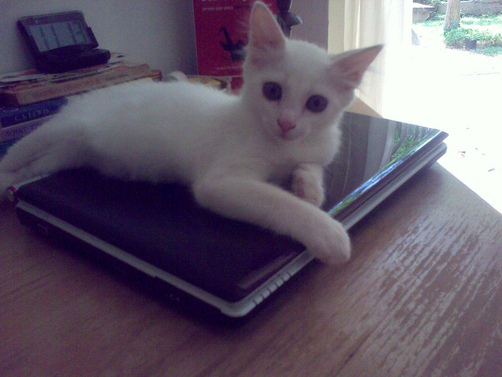Observations at a coffee shop... or how the internet is changing everything about us
Not long ago I picked up Nicholas Carr's book The Shallows: What the Internet is Doing to our Brains and found myself nodding YES YES every few pages. As someone who had always loved to read good nonfiction, I recognized in myself many of the very points that Carr makes -- one of which is that that we are becoming so used to processing myriad bits and pieces of information on the internet that most of us have a difficult time committing much of ANYthing we read to long-term memory anymore.
More than just a theory, Carr references studies over several decades documenting the abilities of working memory ("the contents of our consciousness") versus long-term memory and how what resides in long-term memory shapes who we are, what we believe, how we act and behave. Contrary to the earliest studies in the 1950s that report the human mind can "work" with up to seven pieces of information at a time, the latest research shows it's only two or three. I had to stop and ask myself if the later, lesser number is a product of the internet/information age. Have we actually regressed in our ability to remember what we read because of the constant bombardment of rapid-fire headlines on a daily basis?
I'm one of those who has fallen victim to this phenomenon. I follow the skimming of headlines with the skimming of articles linked to them. How much do I remember? Not much. I confess that I've been doing this so long that I KNOW I can't remember... So I now have a system of folders and files to pack away the urls of stories that contain info/stats/facts that I want to retain. (Ironically, I usually remember there's something I can't remember if I only knew where the heck to find it!)
But I digress. Far more than just our ability to retain what we read, Carr outlines how the internet is changing everything from behavior to values to even our economy (more on that one in a later post). Now that I bake for Cenote, I find myself passing through the cafe's seating area several times a week, and rarely do I see anyone involved in conversation. Rather I notice a sea of computers engaged with their robots (forgive me for saying so, but this is my observation, and I readily admit that I could just as easily be one myself). In fact, as I was doing a routine task, I tried to engage a computer user in conversation only to be completely ignored -- I didn't realize she was wearing headphones. Even though I was about two feet from her at the time she never raised her eyes nor acknowledged my greeting. (Her dog, however, loved the attention ... we had a great little chat.)
So if so many of us, myself included, spend so much time behind our computers engaged only with some highly suspicious EMF waves and free-content-creators, aka "crowds" that we'll never meet, I can't help but wonder what and WHO will we actually remember tomorrow? It's worrisome. I am going to have a really hard time breaking this habit, but I'm gonna try.
More than just a theory, Carr references studies over several decades documenting the abilities of working memory ("the contents of our consciousness") versus long-term memory and how what resides in long-term memory shapes who we are, what we believe, how we act and behave. Contrary to the earliest studies in the 1950s that report the human mind can "work" with up to seven pieces of information at a time, the latest research shows it's only two or three. I had to stop and ask myself if the later, lesser number is a product of the internet/information age. Have we actually regressed in our ability to remember what we read because of the constant bombardment of rapid-fire headlines on a daily basis?
I'm one of those who has fallen victim to this phenomenon. I follow the skimming of headlines with the skimming of articles linked to them. How much do I remember? Not much. I confess that I've been doing this so long that I KNOW I can't remember... So I now have a system of folders and files to pack away the urls of stories that contain info/stats/facts that I want to retain. (Ironically, I usually remember there's something I can't remember if I only knew where the heck to find it!)
But I digress. Far more than just our ability to retain what we read, Carr outlines how the internet is changing everything from behavior to values to even our economy (more on that one in a later post). Now that I bake for Cenote, I find myself passing through the cafe's seating area several times a week, and rarely do I see anyone involved in conversation. Rather I notice a sea of computers engaged with their robots (forgive me for saying so, but this is my observation, and I readily admit that I could just as easily be one myself). In fact, as I was doing a routine task, I tried to engage a computer user in conversation only to be completely ignored -- I didn't realize she was wearing headphones. Even though I was about two feet from her at the time she never raised her eyes nor acknowledged my greeting. (Her dog, however, loved the attention ... we had a great little chat.)
So if so many of us, myself included, spend so much time behind our computers engaged only with some highly suspicious EMF waves and free-content-creators, aka "crowds" that we'll never meet, I can't help but wonder what and WHO will we actually remember tomorrow? It's worrisome. I am going to have a really hard time breaking this habit, but I'm gonna try.


 RSS Feed
RSS Feed